|
|
|
Sort Order |
|
|
|
Items / Page
|
|
|
|
|
|
|
| Srl | Item |
| 1 |
ID:
100198


|
|
|
|
|
| Publication |
2010.
|
| Summary/Abstract |
As the color revolutions have stalled and the challenge to democracy by authoritarianism has increased, it is essential to explore the potential of a new ``reverse wave'' which may create a greater balance between liberalism and autocracy. This article seeks to begin this process by outlining a framework of authoritarian diffusion. Two key diffusion dynamics are outlined: appropriateness, the impact of changes in the relative normative power of democracy/autocracy, and effectiveness, how the successes of authoritarian countries increase the chances that others will see them as role models. A number of contributing factors are also identified, which make these processes more or less likely. These include: geography, linkage, international organizations, great power prestige, and reference groups. If we are to understand the future strength of authoritarianism as a global or regional phenomenon, which affects, reinforces, and aggravates domestic conditions, then a new theoretical framework is necessary.
|
|
|
|
|
|
|
|
|
|
|
|
|
|
|
|
| 2 |
ID:
095632


|
|
|
| 3 |
ID:
094434


|
|
|
|
|
| Publication |
2010.
|
| Summary/Abstract |
Existing studies assess attitudes about Americanness within the context of racial and ethnic group differences. However, this paper examines the relative effects of racial, ethnic, and religious group memberships across a variety of national sentiments, including patriotism and ethnoculturalism. Results from the 1996 and 2004 General Social Surveys (N = 1851) indicate that subgroup affiliations strongly influence beliefs about the salience and substance of American national identity. The implications for the complexity of the findings are discussed, as well as suggestions for future research.
|
|
|
|
|
|
|
|
|
|
|
|
|
|
|
|
| 4 |
ID:
110656
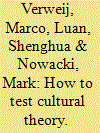

|
|
|
|
|
| Publication |
2011.
|
| Summary/Abstract |
This symposium highlighted the relevance of the cultural theory (CT) pioneered by anthropologists Mary Douglas, Steve Rayner, and Michael Thompson and political scientists Aaron Wildavsky and Richard Ellis for explaining political phenomena. In this concluding article, we suggest ways in which CT can be further tested and developed. First, we describe how the theory has been applied thus far and some of the achievements of these applications. Then, we examine some of the challenges revealed by this research. Finally, we discuss ways of applying CT that promise to help meet these challenges. These methods include nesting case studies and combining case study and survey research, simulations, experiments, and approaches from social neuroscience.
|
|
|
|
|
|
|
|
|
|
|
|
|
|
|
|
| 5 |
ID:
124762
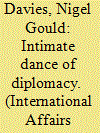

|
|
|
|
|
| Publication |
2013.
|
| Summary/Abstract |
Those who study international relations pay little attention to those who practise them. But the terms of scholarly explanation-the great abstractions of state, interest, power and so on-are always embodied in human representatives, and their interactions mediated through human relationships. The daily experience, lived and felt, of diplomats thus offers a valuable perspective on how international relations work. Two recent studies by Iver Neumann capture this world through an anthropology of the diplomatic tribe. They illuminate the highly distinctive conventions, rituals and symbols of this world, showing how diplomats are recruited and socialized, where and how they perform their roles and how they communicate -and how these practices evolve in the face of social and technological change. Diplomats emerge as indispensable specialists in creating, asserting and agreeing meaning, and diplomatic conduct as a critical variable in explaining international outcomes. Taking the perspective of practice seriously can build a better political science of international relations, balancing first-person understanding with third-person explanation, impersonal forces with human stories, and contextual facts with their rhetorical construction. It can also help bridge the gap between theory and practice. This points to an exciting agenda for future research
|
|
|
|
|
|
|
|
|
|
|
|
|
|
|
|
| 6 |
ID:
121433
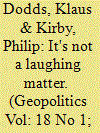

|
|
|
|
|
| Publication |
2013.
|
| Summary/Abstract |
This paper explores the possibilities of considering humour and laughter as a serious matter of concern for critical geopolitics and political geography more generally. While there has been some interest in this topic, there is scope to devise a more expansive research agenda. Using both laughter and Michael Billig's notion of unlaughter, the paper considers how these visceral expressions contribute, often in subtle ways, to the making of geopolitical subjectivities. The final part of the paper considers some possibilities for future research.
|
|
|
|
|
|
|
|
|
|
|
|
|
|
|
|
| 7 |
ID:
123619


|
|
|
|
|
| Publication |
2013.
|
| Summary/Abstract |
Media attention is unevenly allocated across global human rights problems, prompting anger, frustration, and recrimination in the international system. This article demonstrates that from 1981 to 2000, three leading Anglo-American media sources disproportionately covered Latin American abuses, in human rights terms, as compared to other world regions. This "Latin Human Rights Bias" runs counter to broader trends within the Anglo-American general coverage of foreign news, where Latin America's share of reporting is far smaller. The Bias is partially explained by the region's proximity to the United States (US), its relevance to US policy debates, and by path dependency. A significant portion of the Latin Bias remains unexplained, however, despite our best attempts to rigorously model explanations offered by leading Western journalists. These findings suggest that geographic regions are an important factor in the media's perception of global human rights problems and that both human rights policymakers and scholars may be inappropriately drawing general lessons from regionally specific and biased patterns. We conclude with suggestions for future research.
|
|
|
|
|
|
|
|
|
|
|
|
|
|
|
|
| 8 |
ID:
131554


|
|
|
|
|
| Publication |
2014.
|
| Summary/Abstract |
Unlike the massive literature about US Supreme Court confirmation battles, little has been written about lower federal court confirmation fights. However, in the past 20 years much has been written about the lower federal court confirmation process. Here, we take stock of the political science literature in this area and highlight where scholarly interest appears to be going. Believing a contemporary assessment of the state of the field should be of interest and use to scholars of American politics, we dissect the recent empirical literature and offer suggestions for future research. Most importantly, we offer a one-stop shop for recent literature for scholars interested in this topic.
|
|
|
|
|
|
|
|
|
|
|
|
|
|
|
|
| 9 |
ID:
132064


|
|
|
|
|
| Publication |
2014.
|
| Summary/Abstract |
Kony 2012, a film released by the nonprofit Invisible Children in the spring of 2012, drew a flurry of Facebook "shares" and "likes." However, critics expressed a concern that the film offered a distorted portrayal of Africans and African politics. In this article, we test these criticisms by asking what effects the film had on college students' perceptions of Africa and Africans. To address this question, we draw on a survey and an experiment conducted at a small liberal arts college where Kony 2012 enjoyed popularity. The results show that the film did affect students' perceptions of Africa; specifically, it led many to perceive Africans as lacking agency and autonomy. We argue that whereas the film did have initial negative effects on students' perceptions of Africa, these effects seem to fade over time. Future research should explore the compounding effects of exposure to images that misrepresent the African continent.
|
|
|
|
|
|
|
|
|
|
|
|
|
|
|
|
| 10 |
ID:
086991
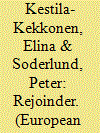

|
|
|
|
|
| Publication |
2009.
|
| Summary/Abstract |
We are delighted to see that Arzheimer and Carter (2009) have taken up the challenge to discuss possible flaws in our (Kestila and Soderlund 2007) application of political opportunity sturcture theory in the subnational context.They address several interesting questions in their critique of our paper, and they make some good points worth considering in future research.
|
|
|
|
|
|
|
|
|
|
|
|
|
|
|
|
| 11 |
ID:
171282


|
|
|
|
|
| Summary/Abstract |
A growing body of research investigates the factors that enhance the research productivity and creativity of political scientists. This work provides a foundation for future research, but it has not addressed some of the most promising causal hypotheses in the general scientific literature on this topic. This article explicates the latter hypotheses, a typology of scientific career paths that distinguishes how scientific careers vary over time with respect to creative ambitions and achievements, and a research agenda based on the preceding components for investigation of the publication success of political scientists.
|
|
|
|
|
|
|
|
|
|
|
|
|
|
|
|
| 12 |
ID:
110268
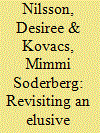

|
|
|
|
|
| Publication |
2011.
|
| Summary/Abstract |
In a seminal article, Stedman (International Security, 22, 1997, 5) suggested that the greatest source of risk to civil war peace processes comes from so-called spoilers, leaders, and groups that perceive peace as threatening and use violence to undermine attempts to achieve it. The spoiler concept has since gained significant ground and widespread legitimacy both in the academic literature and in critical policy circles. In the footsteps of this development, however, we suggest that the spoiler concept has been stretched beyond its original meaning and given raise to a number of ambiguities concerning its definition and empirical applicability. This lack of clarity in regard to some of the key aspects of the spoiler concept does not only risk undermining the usefulness of the concept itself, but also risks hampering the accumulation of valuable research on this pertinent topic. This article presents a reflection on a burgeoning research field and aims to contribute to the same by attempting to offer greater conceptual clarity in regard to a number of issues that are the core of the spoiler debate and by presenting a conceptual framework for analyzing spoilers in future research.
|
|
|
|
|
|
|
|
|
|
|
|
|
|
|
|
|
|
|
|
|